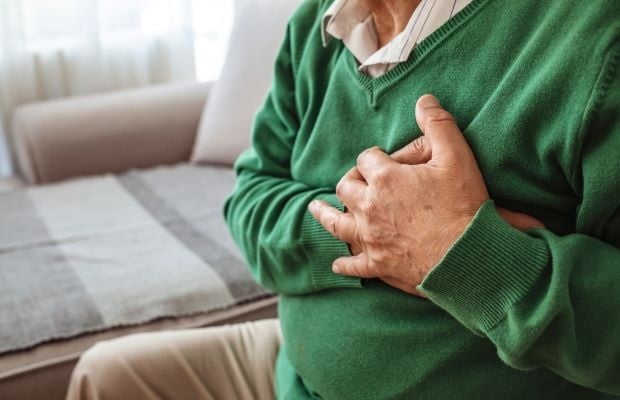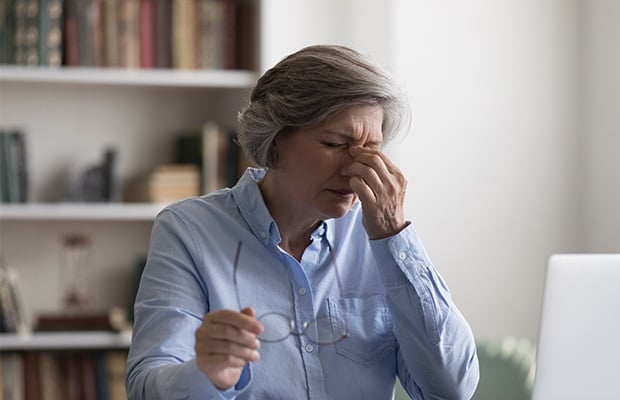What is shortness of breath?
Feeling short of breath can be worrying. It can feel like not enough air is getting into your lungs, or that you’re struggling to catch your breath. Some people describe it as feeling breathless.
The medical term for shortness of breath is ‘dyspnoea’ and you may hear your doctor or nurse describe it this way.
What causes shortness of breath?
Many people living with heart conditions experience shortness of breath as a symptom of their condition.
It’s common with heart attack, chest pain (angina), heart failure, heart valve disease and some abnormal heart rhythm disorders (arrythmias) like atrial fibrillation (AF).
These heart conditions cause breathlessness because they stop the heart working properly resulting in:
- A shortage of oxygen-rich blood getting to the rest of your body, which triggers you to breathe faster to get more oxygen.
- Fluid building up in the lungs, making it difficult to breathe, especially in people with heart failure.
Lung conditions including asthma, chronic obstructive pulmonary disease (COPD) and chest infections can also make people feel short of breath, as can anxiety.
If you are pregnant, you may also experience breathlessness, particularly when your baby grows bigger. This is normal, but if you’re concerned, or have any other symptoms, you should speak to your doctor or midwife.
Are there different types of shortness of breath?
There are 2 main types of breathlessness:
- Persistent (chronic) – this is when you feel breathless every day. For example, if you’re living with heart failure you may feel short of breath a lot of the time, even if your condition is well managed on medicines.
- Sudden (acute) – this is breathlessness that comes on very quickly. This can happen with heart failure and other heart conditions like heart rhythm problems.
Physical exertion, such as exercising or climbing stairs, can lead to breathlessness for some people with heart conditions too. You may not feel breathless at the time, but you may notice you’re becoming more breathless over time.
If this sounds like you – and you do not already have a diagnosed condition that causes breathlessness – then it’s important to see a doctor to have this investigated.
Can anxiety make shortness of breath worse?
Being short of breath can be frightening and may trigger feelings of anxiety. You may start to panic because you feel like you cannot breathe – which in turn can lead to more rapid breathing, making your breathlessness worse.
You could experience a panic attack, which is when a range of physical symptoms build up quickly.
These include:
- a pounding or racing heartbeat
- feeling faint, dizzy or light-headed
- feeling very hot or very cold
- sweating, trembling or shaking
- nausea (feeling sick)
- pain in your chest or abdomen
- struggling to breathe or feeling like you're choking
- feeling like your legs are shaky or are turning to jelly
- feeling disconnected from your mind, body or surroundings.
According to the charity Mind, most panic attacks last between 5 to 20 minutes. They can come on very quickly with symptoms usually at their worst within 10 minutes.
They are frightening because they can make you feel very afraid that you’re losing control, or are going to faint, die, or that you're having a heart attack.
To help you through a panic attack, Mind suggests you:
- Focus on your breath by breathing slowly in and out while counting to 5.
- Stamp on the spot as some people find this helps control their breathing.
- Focus to your senses by tasting a mint-flavoured sweet or cuddling something soft.
Mind has more helpful information on panic attacks on its website.
When do you need medical attention for shortness of breath?
If you’re having severe difficulty breathing and are gasping or choking, and you have other symptoms like chest pain, you should call 999 or get someone to take you to A&E.
If you have shortness of breath as a chronic symptom of a heart condition, it can be tricky to know when to speak to a doctor.
Find out from your doctor what new or changing symptoms you need to look out for that would indicate you need medical attention.
If you’re worried about shortness of breath, ask yourself:
- Are my symptoms new or worse than usual?
- How long have these symptoms been going on for or changing?
The NHS has more helpful information about shortness of breath on their website.
What’s the treatment for shortness of breath?
If you have shortness of breath, your doctor will work with you on a plan to treat the underlying cause, whether that’s heart attack, chest pain (angina), heart failure, heart valve disease, arrythmia or another heart condition.
But even with treatment, shortness of breath can make daily living difficult. So, getting emotional support from family and friends to help you accept your shortness of breath, and its impact on your life, is important.
There are several practical steps you can take that can really make a difference too. And once you find what works for you, you can live well with breathlessness.










